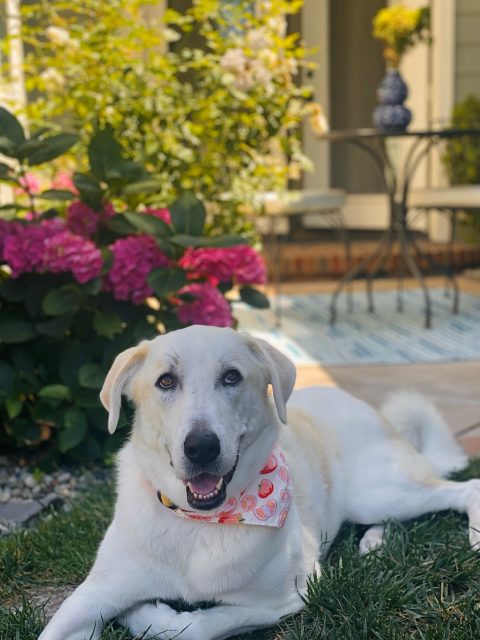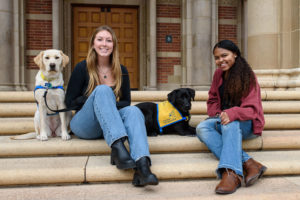This post was updated Oct. 20 at 9:09 p.m.
Now that the dog days of summer have come to an end, I am missing my puppy more than ever. Often, my homesickness morphs into a longing for my four-legged best friend.
Ever since my family adopted our first dog, my heart has indefinitely grown to not only love and adore these animals but depend on them.
At 14, I started dog-sitting and as I formed relationships with other dogs, I began to realize that they are more than just pets – they are life companions.
Studies show that interacting with animals brings physical benefits, such as decreasing stress and lowering our blood pressure. But beyond that, dogs offer a sense of security while fostering emotional well-being through the bonds we share with them.
Emilia Podesta, a second-year disability studies and public affairs student and the shadowing president of Collar Scholars – a collegiate chapter of Canine Companions that supports service dogs in training – believes that the relationships she has with dogs significantly reduced her anxiety and stress.
Although the historical relationship between these species has lasted for thousands of years now, dogs and humans remain an interesting evolutionary pair.
Just as humans bond through eye contact, a similar form of gaze-bonding between us and our dogs is mediated by the hormone oxytocin. Often, when I’m procrastinating, I have staring contests with my dog, Luna.
Could this be a subconscious coping mechanism to alleviate my fears?
Helen Ringley, a fourth-year human biology and society student and the puppy raising coordinator for Collar Scholars, explained how when walking with a dog, your project yourself differently to the world and those around you.
Not only does loneliness decrease when someone has a loving pet, but it also increases their frequency of social interactions. Being with or around a dog can act as a natural conversation starter between individuals.
“Having a dog a lot of times for people with disabilities makes them feel like they are being seen, and they are being approached and they have an easier time talking to people,” Ringley said. “I think that’s a really really important thing people don’t quite realize about dogs is how much they change your interaction with the social world.”
In an article for Time Magazine, Jeffrey Kluger wrote that long ago, humans and dogs became woven together into one another’s lives. Kluger compares it to how you can’t separate red and yellow once you mix them to get the color orange.
Podesta said there is a reason as to why dogs have coevolved with us, whether that is in regards to the lessons we learn through caring for them or the reflective process they grant us when looking at life through their eyes.
Love is a fundamental connection and feeling that we all need as humans. Everyone should experience the kind of love that doesn’t come with exceptions or expectations.
Ringley said having an animal in your life that is consistently positive and does not extend judgment toward your emotions, especially for individuals who might be experiencing a difficult time, can be vital.
In college, I find it challenging to not have my dog by my side. Before I transferred to UCLA, I had no idea how important my dog’s presence was to my own overall well-being.
Treating a pet more like a person, or simply viewing them as a friend, is a much more common trait among those who experience higher levels of anxiety.
This brings me to realize my reliance on my dog: Our relationship is medicine for my mind.
Freshmen and first-year transfer students are constantly thrown into new environments, making feelings of anxiety inevitable. The transition to finding a sense of belonging on a campus with tens of thousands of students can be overwhelming, stressful and isolating at times.
“My freshman year, especially when I went from having dogs all the time and then living in a dorm where you never see a dog ever, was definitely an adjustment,” Ringley said.
A year ago, I would have said that there is no way to cope with these feelings of detachment from your dog, but now I know that is not true.
Through clubs on campus such as Collar Scholars or the Bruin Animal Rescue Coalition, UCLA gives students the opportunity to care for potential service dogs or volunteer with shelter animals. Not only do individuals get the chance to spend time with dogs, but they get the chance to aid and support them too.
UCLA People-Animal Connection invites students on campus during finals week to spend time with its therapy dogs, and if you’re lucky, you might even run into these adorable, smiling pups on an ordinary day.
From personal experience, the Student Wellness Commission sometimes provides petting zoos and goat yoga in the middle of Wilson Plaza.
“For some individuals who maybe experience senses differently, or the world differently, animals are a really good grounding aspect because they’re borderline unanimous across everything,” Podesta said.
Animals at UCLA – even if it’s the quirky squirrels, the vast amount of birds or people just walking their dogs through campus – are not lacking. I’ve noticed that simply just seeing someone playing fetch with their dog brings a smile to my face.
“They add a lot of beauty to your world,” Ringley said.
And I couldn’t agree more.
If you’re missing your puppy or if you’re looking for the presence of an animal, take advantage of the opportunities UCLA has to offer when it comes to connecting with fellow dog people and animal lovers.
And who knows, they might even find you.





Comments are closed.